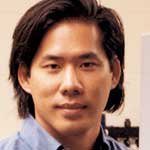Biotechnology & medicine
Nimmi Ramanujam
Uses light to help make diagnosing breast cancer and cervical cancer faster, more accurate and less invasive

Global
Eugene Chan
Aims to speed genome sequencing with a machine that reads DNA letter by letter

Global
Serafim Batzoglou
Devises powerful tools for assembling and analyzing genomes

Global
Micah Siegel
Transforms research from universities and national labs into successful startups

Global
Giovanni Traverso
Came up with a noninvasive alternative to colonoscopy
